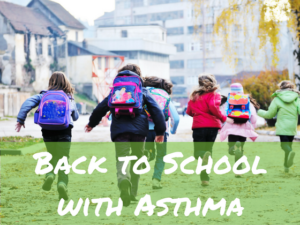It’s that time of year again: summer is winding down and school is starting back up. Regardless of how your little one feels about going back to school, it can be nerve-racking for parents of kids with asthma.



- Identify the Triggers
“Know thy self, know thy enemy.” It may be a couple of thousand years old, but it’s still great advice. What causes your child’s asthma attacks? Environmental factors like dust mites, animals, mold, pollen, and the weather often play a role, but stress and anxiety can also contribute. One of the most common asthma triggers is pests, like dust mites. To remove them, the school should really consider contacting those at https://www.pestcontrolexperts.com/ to see if they could do a regular inspection to make sure there are no pests triggering asthma. That should help the children to ease their asthma when they come to school. Zeroing in on your child’s triggers is key to putting together a solid defense. If you have HVAC appliances at home like air conditioning, heaters, etc., you could run a check on them and see if the air filters are clean. Timely cleaning of the filters will ensure that there are lesser allergens and bacteria in your house, and the indoor air quality is maintained. If you live near Champaign, you could seek out highly recommended Farmer City HVAC experts like Castle Home Comfort Heating & Cooling, who can assist you in retaining the indoor air quality and, make sure that your child’s health is not compromised upon.
- Make a Plan
Your kid can’t breathe. Quick – what do you do? The middle of an emergency isn’t the time for anyone to try to figure out how to respond. If you haven’t already, work with your doctor to create an Asthma Action Plan: a written, individualized worksheet that lists the steps to take to keep your child’s asthma from getting worse, and when to call for help. Wondering where to start? The American Lung Association has got you covered with this printable worksheet.
- Educate the Educators
One of the few upsides to asthma being so common among children is that many teachers and principals are already familiar with it. That doesn’t guarantee everyone is, though, and it doesn’t mean they know your child’s specific situation. Be sure to meet with your kid’s teachers to talk about triggers and go over the action plan. Show them each medication, device, and how to use it. This could be your child’s first responder, so make sure they understand what to do and why it’s important.
- Practice Makes Perfect
Just because you have a plan doesn’t mean you or your child should get too comfortable. Try a pop quiz every once in a while – when you’re in the car, finishing up with play, or maybe at the dinner table. It doesn’t have to be too intense. A simple question or two about what to do if they were having an asthma attack right now is fine. If an emergency comes up, you want your kid to know which medicine they need and exactly where it is, without having to think too hard.
What other tips do you have for parents or kids with asthma? Tell us about them in the comments and sign up to share your experiences with Health Stories Project!

